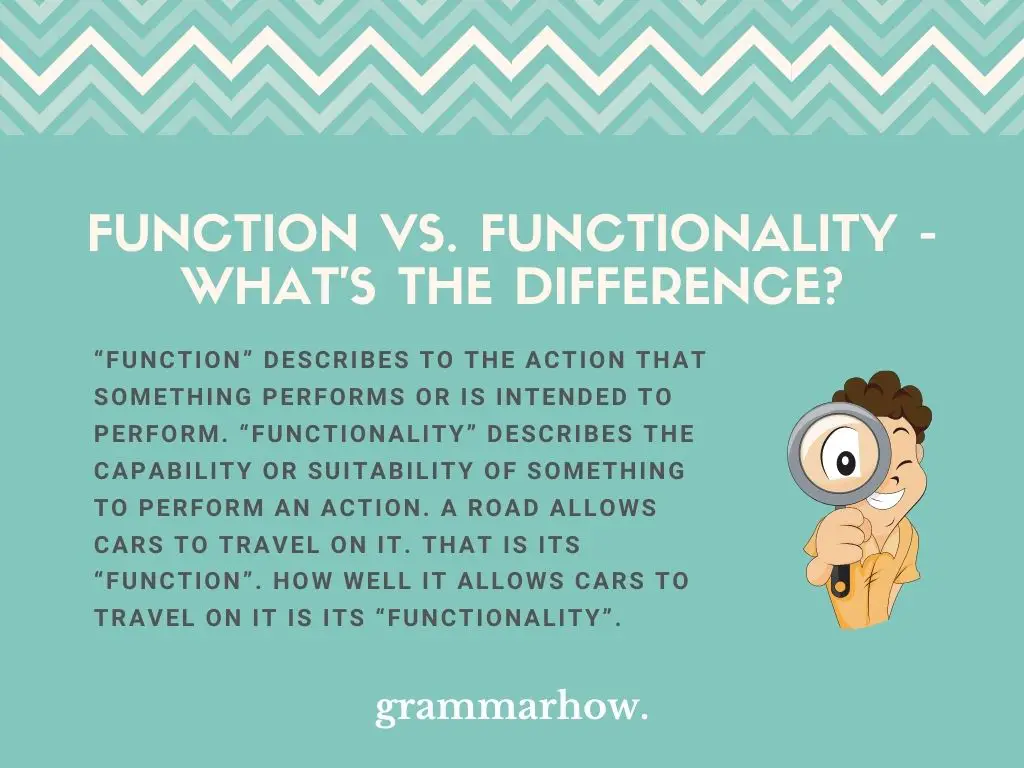When two words are barely different in spelling at all, it’s hard to tell if there’s any significant difference in their meaning as well. If you’re confused about the difference between function and functionality, you may be worried about making a silly mistake on an academic paper.
In this post, we’ll talk about the difference between function and functionality.
Function vs. Functionality – What’s the Difference?
“Function” describes to the action that something performs or is intended to perform. “Functionality” describes the capability or suitability of something to perform an action. A road allows cars to travel on it. That is its “function”. How well it allows cars to travel on it is its “functionality”.

Small differences like this can confuse a lot of people. Very similar words often have very similar meanings, with just slightly different context. This is the case with “function” and “functionality”. They sound very similar, but don’t mean exactly the same thing.
Let’s take a look at an example to help explain the difference:
- The function of this bridge is to allow cars to pass over the river.
- This bridge is old, so it cannot support as much weight as it used to and its functionality has decreased.
In the first sentence, we are told what purpose the bridge serves. This is the bridge’s “function”. In the second sentence, we are told how well the bridge can serve its purpose. This is its “functionality”.
“Function” tells you what the bridge does. “Functionality” tells you how well the bridge does it. The difference is minor, but it does exist. This means that these two words are not interchangeable. You will be incorrect if you use “functionality” to refer to an object’s purpose.
For more detail about the differences between the two, continue reading below.
Function
Merriam-Webster defines “function” as “the action for which a person or thing is specially fitted or used or for which a thing exists”. Something’s “function” is its “purpose”. However, this word does not say anything about how well an object fulfills its purpose. It only says what the purpose is.
Consider the following example:
- The function of a telephone is to allow long-distance verbal communication between two people.
- The primary function of the first telephone and the newest model today are identical.
In these sentences, “function” tells us what main purpose phones serve. But it does not tell us how well phones serve this purpose. For instance, in the second sentence, nothing is said about how the first telephone obviously does a worse job fulfilling its purpose than new phones do.
That’s because “function” does not include effectiveness. It only refers to what something is intended to do. This is what separates it from “functionality”.
Functionality
Merriam-Webster defines “functionality” as “the quality or state of being functional”. In other words, “functionality” describes how well something does its job. Something that fulfills its purpose very well has “good” functionality. Something that doesn’t do its job very well has “poor functionality”.
Consider the following example:
- The functionality of this winter jacket is amazing; it keeps me warm even in freezing temperatures!
- I have nothing good to say about the functionality of this winter jacket; it doesn’t keep me very warm at all.
In both of these sentences, “functionality” refers to how well the winter jacket fulfills its purpose, not what the purpose of the winter jacket is. Contextually, the sentence tells us what a winter jacket is supposed to do, but “functionality” just tells us how well the jacket is fulfilling its purpose.
Conclusion
“Function” describes the purpose of an object. “Functionality” describes the effectiveness of an object in fulfilling its purpose.
The “function” of a lightbulb is to provide light. The “functionality” of a lightbulb is how effectively it provides light. The difference is minor, but it does exist. These two words are not interchangeable. Be sure to use the right one for the right situation!

Martin holds a Master’s degree in Finance and International Business. He has six years of experience in professional communication with clients, executives, and colleagues. Furthermore, he has teaching experience from Aarhus University. Martin has been featured as an expert in communication and teaching on Forbes and Shopify. Read more about Martin here.
